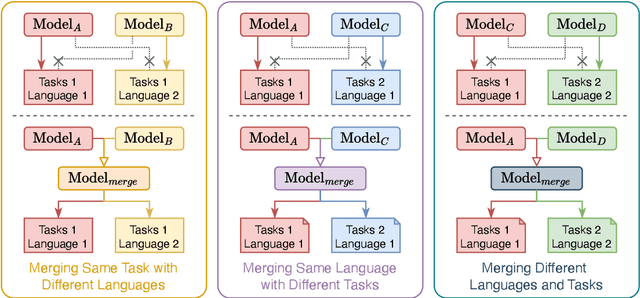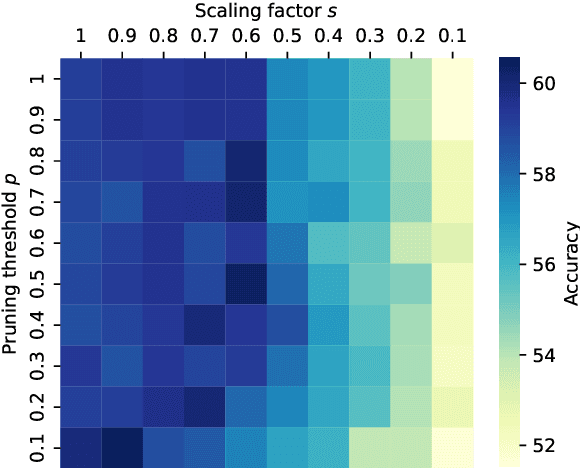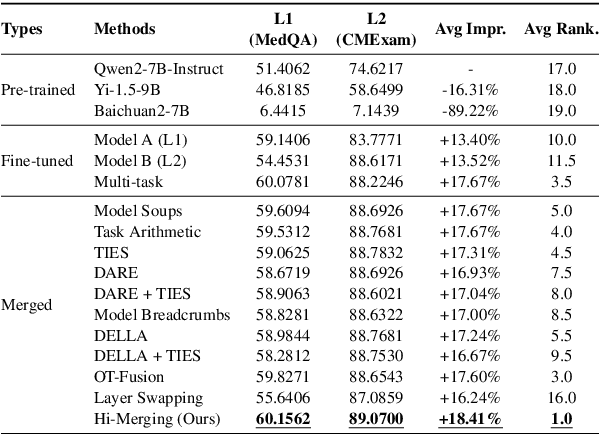Wanyu Wang
Renormalization Group Guided Tensor Network Structure Search
Dec 31, 2025Abstract:Tensor network structure search (TN-SS) aims to automatically discover optimal network topologies and rank configurations for efficient tensor decomposition in high-dimensional data representation. Despite recent advances, existing TN-SS methods face significant limitations in computational tractability, structure adaptivity, and optimization robustness across diverse tensor characteristics. They struggle with three key challenges: single-scale optimization missing multi-scale structures, discrete search spaces hindering smooth structure evolution, and separated structure-parameter optimization causing computational inefficiency. We propose RGTN (Renormalization Group guided Tensor Network search), a physics-inspired framework transforming TN-SS via multi-scale renormalization group flows. Unlike fixed-scale discrete search methods, RGTN uses dynamic scale-transformation for continuous structure evolution across resolutions. Its core innovation includes learnable edge gates for optimization-stage topology modification and intelligent proposals based on physical quantities like node tension measuring local stress and edge information flow quantifying connectivity importance. Starting from low-complexity coarse scales and refining to finer ones, RGTN finds compact structures while escaping local minima via scale-induced perturbations. Extensive experiments on light field data, high-order synthetic tensors, and video completion tasks show RGTN achieves state-of-the-art compression ratios and runs 4-600$\times$ faster than existing methods, validating the effectiveness of our physics-inspired approach.
BlossomRec: Block-level Fused Sparse Attention Mechanism for Sequential Recommendations
Dec 15, 2025Abstract:Transformer structures have been widely used in sequential recommender systems (SRS). However, as user interaction histories increase, computational time and memory requirements also grow. This is mainly caused by the standard attention mechanism. Although there exist many methods employing efficient attention and SSM-based models, these approaches struggle to effectively model long sequences and may exhibit unstable performance on short sequences. To address these challenges, we design a sparse attention mechanism, BlossomRec, which models both long-term and short-term user interests through attention computation to achieve stable performance across sequences of varying lengths. Specifically, we categorize user interests in recommendation systems into long-term and short-term interests, and compute them using two distinct sparse attention patterns, with the results combined through a learnable gated output. Theoretically, it significantly reduces the number of interactions participating in attention computation. Extensive experiments on four public datasets demonstrate that BlossomRec, when integrated with state-of-the-art Transformer-based models, achieves comparable or even superior performance while significantly reducing memory usage, providing strong evidence of BlossomRec's efficiency and effectiveness.The code is available at https://github.com/ronineume/BlossomRec.
ODMA: On-Demand Memory Allocation Framework for LLM Serving on LPDDR-Class Accelerators
Dec 10, 2025Abstract:Serving large language models (LLMs) on accelerators with poor random-access bandwidth (e.g., LPDDR5-based) is limited by current memory managers. Static pre-allocation wastes memory, while fine-grained paging (e.g., PagedAttention) is ill-suited due to high random-access costs. Existing HBM-centric solutions do not exploit the characteristics of random-access-constrained memory (RACM) accelerators like Cambricon MLU370. We present ODMA, an on-demand memory allocation framework for RACM. ODMA addresses distribution drift and heavy-tailed requests by coupling a lightweight length predictor with dynamic bucket partitioning and a large-bucket safeguard. Boundaries are periodically updated from live traces to maximize utilization. On Alpaca and Google-NQ, ODMA improves prediction accuracy of prior work significantly (e.g., from 82.68% to 93.36%). Serving DeepSeek-R1-Distill-Qwen-7B on Cambricon MLU370-X4, ODMA raises memory utilization from 55.05% to 72.45% and improves RPS and TPS by 29% and 27% over static baselines. This demonstrates that hardware-aware allocation unlocks efficient LLM serving on RACM platforms.
Model Merging for Knowledge Editing
Jun 14, 2025Abstract:Large Language Models (LLMs) require continuous updates to maintain accurate and current knowledge as the world evolves. While existing knowledge editing approaches offer various solutions for knowledge updating, they often struggle with sequential editing scenarios and harm the general capabilities of the model, thereby significantly hampering their practical applicability. This paper proposes a two-stage framework combining robust supervised fine-tuning (R-SFT) with model merging for knowledge editing. Our method first fine-tunes the LLM to internalize new knowledge fully, then merges the fine-tuned model with the original foundation model to preserve newly acquired knowledge and general capabilities. Experimental results demonstrate that our approach significantly outperforms existing methods in sequential editing while better preserving the original performance of the model, all without requiring any architectural changes. Code is available at: https://github.com/Applied-Machine-Learning-Lab/MM4KE.
* 11 pages, 3 figures
Training-free LLM Merging for Multi-task Learning
Jun 14, 2025



Abstract:Large Language Models (LLMs) have demonstrated exceptional capabilities across diverse natural language processing (NLP) tasks. The release of open-source LLMs like LLaMA and Qwen has triggered the development of numerous fine-tuned models tailored for various tasks and languages. In this paper, we explore an important question: is it possible to combine these specialized models to create a unified model with multi-task capabilities. We introduces Hierarchical Iterative Merging (Hi-Merging), a training-free method for unifying different specialized LLMs into a single model. Specifically, Hi-Merging employs model-wise and layer-wise pruning and scaling, guided by contribution analysis, to mitigate parameter conflicts. Extensive experiments on multiple-choice and question-answering tasks in both Chinese and English validate Hi-Merging's ability for multi-task learning. The results demonstrate that Hi-Merging consistently outperforms existing merging techniques and surpasses the performance of models fine-tuned on combined datasets in most scenarios. Code is available at: https://github.com/Applied-Machine-Learning-Lab/Hi-Merging.
* 14 pages, 6 figures
KAITIAN: A Unified Communication Framework for Enabling Efficient Collaboration Across Heterogeneous Accelerators in Embodied AI Systems
May 15, 2025Abstract:Embodied Artificial Intelligence (AI) systems, such as autonomous robots and intelligent vehicles, are increasingly reliant on diverse heterogeneous accelerators (e.g., GPGPUs, NPUs, FPGAs) to meet stringent real-time processing and energy-efficiency demands. However, the proliferation of vendor-specific proprietary communication libraries creates significant interoperability barriers, hindering seamless collaboration between different accelerator types and leading to suboptimal resource utilization and performance bottlenecks in distributed AI workloads. This paper introduces KAITIAN, a novel distributed communication framework designed to bridge this gap. KAITIAN provides a unified abstraction layer that intelligently integrates vendor-optimized communication libraries for intra-group efficiency with general-purpose communication protocols for inter-group interoperability. Crucially, it incorporates a load-adaptive scheduling mechanism that dynamically balances computational tasks across heterogeneous devices based on their real-time performance characteristics. Implemented as an extension to PyTorch and rigorously evaluated on a testbed featuring NVIDIA GPUs and Cambricon MLUs, KAITIAN demonstrates significant improvements in resource utilization and scalability for distributed training tasks. Experimental results show that KAITIAN can accelerate training time by up to 42% compared to baseline homogeneous systems, while incurring minimal communication overhead (2.8--4.3%) and maintaining model accuracy. KAITIAN paves the way for more flexible and powerful heterogeneous computing in complex embodied AI applications.
STAR-Rec: Making Peace with Length Variance and Pattern Diversity in Sequential Recommendation
May 06, 2025Abstract:Recent deep sequential recommendation models often struggle to effectively model key characteristics of user behaviors, particularly in handling sequence length variations and capturing diverse interaction patterns. We propose STAR-Rec, a novel architecture that synergistically combines preference-aware attention and state-space modeling through a sequence-level mixture-of-experts framework. STAR-Rec addresses these challenges by: (1) employing preference-aware attention to capture both inherently similar item relationships and diverse preferences, (2) utilizing state-space modeling to efficiently process variable-length sequences with linear complexity, and (3) incorporating a mixture-of-experts component that adaptively routes different behavioral patterns to specialized experts, handling both focused category-specific browsing and diverse category exploration patterns. We theoretically demonstrate how the state space model and attention mechanisms can be naturally unified in recommendation scenarios, where SSM captures temporal dynamics through state compression while attention models both similar and diverse item relationships. Extensive experiments on four real-world datasets demonstrate that STAR-Rec consistently outperforms state-of-the-art sequential recommendation methods, particularly in scenarios involving diverse user behaviors and varying sequence lengths.
A Survey of Personalization: From RAG to Agent
Apr 14, 2025Abstract:Personalization has become an essential capability in modern AI systems, enabling customized interactions that align with individual user preferences, contexts, and goals. Recent research has increasingly concentrated on Retrieval-Augmented Generation (RAG) frameworks and their evolution into more advanced agent-based architectures within personalized settings to enhance user satisfaction. Building on this foundation, this survey systematically examines personalization across the three core stages of RAG: pre-retrieval, retrieval, and generation. Beyond RAG, we further extend its capabilities into the realm of Personalized LLM-based Agents, which enhance traditional RAG systems with agentic functionalities, including user understanding, personalized planning and execution, and dynamic generation. For both personalization in RAG and agent-based personalization, we provide formal definitions, conduct a comprehensive review of recent literature, and summarize key datasets and evaluation metrics. Additionally, we discuss fundamental challenges, limitations, and promising research directions in this evolving field. Relevant papers and resources are continuously updated at https://github.com/Applied-Machine-Learning-Lab/Awesome-Personalized-RAG-Agent.
Breaking Shallow Limits: Task-Driven Pixel Fusion for Gap-free RGBT Tracking
Mar 14, 2025Abstract:Current RGBT tracking methods often overlook the impact of fusion location on mitigating modality gap, which is key factor to effective tracking. Our analysis reveals that shallower fusion yields smaller distribution gap. However, the limited discriminative power of shallow networks hard to distinguish task-relevant information from noise, limiting the potential of pixel-level fusion. To break shallow limits, we propose a novel \textbf{T}ask-driven \textbf{P}ixel-level \textbf{F}usion network, named \textbf{TPF}, which unveils the power of pixel-level fusion in RGBT tracking through a progressive learning framework. In particular, we design a lightweight Pixel-level Fusion Adapter (PFA) that exploits Mamba's linear complexity to ensure real-time, low-latency RGBT tracking. To enhance the fusion capabilities of the PFA, our task-driven progressive learning framework first utilizes adaptive multi-expert distillation to inherits fusion knowledge from state-of-the-art image fusion models, establishing robust initialization, and then employs a decoupled representation learning scheme to achieve task-relevant information fusion. Moreover, to overcome appearance variations between the initial template and search frames, we presents a nearest-neighbor dynamic template updating scheme, which selects the most reliable frame closest to the current search frame as the dynamic template. Extensive experiments demonstrate that TPF significantly outperforms existing most of advanced trackers on four public RGBT tracking datasets. The code will be released upon acceptance.
Scenario-Wise Rec: A Multi-Scenario Recommendation Benchmark
Dec 23, 2024Abstract:Multi Scenario Recommendation (MSR) tasks, referring to building a unified model to enhance performance across all recommendation scenarios, have recently gained much attention. However, current research in MSR faces two significant challenges that hinder the field's development: the absence of uniform procedures for multi-scenario dataset processing, thus hindering fair comparisons, and most models being closed-sourced, which complicates comparisons with current SOTA models. Consequently, we introduce our benchmark, \textbf{Scenario-Wise Rec}, which comprises 6 public datasets and 12 benchmark models, along with a training and evaluation pipeline. Additionally, we validated the benchmark using an industrial advertising dataset, reinforcing its reliability and applicability in real-world scenarios. We aim for this benchmark to offer researchers valuable insights from prior work, enabling the development of novel models based on our benchmark and thereby fostering a collaborative research ecosystem in MSR. Our source code is also publicly available.
 Add to Chrome
Add to Chrome Add to Firefox
Add to Firefox Add to Edge
Add to Edge